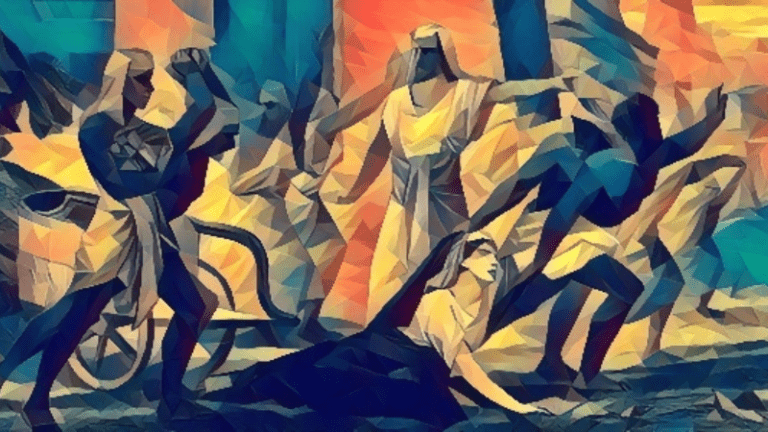Taoism: Still Relevant Today (How It Can Improve Your Life)
Taoism has been gaining more and more attention lately as people look for ways to live a simpler and more stress-free life. But what is Taoism? How did it come into being? And what are its main principles?
In this article, we take an in-depth look at Taoism - from its history and philosophy to how you can apply it in your own life.
So without further ado, let's dive in and learn all about Taoism!
What is Taoism and how it started
Taoism is an ancient Chinese philosophy that emphasizes living in harmony with the Tao - the universal law or truth that governs everything.
I first heard about Taoism in religion class at school. The teacher introduced it as one of the most popular religions in the world. And although this is true, it is not the whole truth, because Taoism has more to offer...
What is Taoism?
Taoism is an ancient Chinese philosophy that emphasizes the importance of living in harmony with the Tao, or the natural order of things. The Tao is seen as a force that flows through all things, and by becoming in tune with it, one can achieve a state of balance and peace. In all areas of life, including relationships, health, work and spirituality.
Taoism also emphasizes the importance of living in the present moment and being aware of one's surroundings. The philosophy teaches that we should be content with what we have instead of constantly striving for more.
So, is Taoism not a religion?
Well...
It depends on how one practices Taoism. One can see it exclusively as a philosophical school (like Stoicism or Existentialism), as was the case in the early days. Or one can see it as a religion with its own beliefs and rituals (like Christianity, Buddhism, Islam, etc.). In fact, there are many people (especially in China) who practice Taoism as a religion.
However, most people who call themselves Taoists would probably say that it is a bit of both. For them, Taoism is a way of life that helps them live in harmony with the world around them and find peace within themselves.
The difference usually becomes clear when one checks whether rituals and mystical components are to be found or not. If they are present, it is a kind of religious Taoism, if not, it is more of a philosophical view.
Why is Taoism often misunderstood?
One of the main reasons why Taoism is often misunderstood is that it is seen as contradictory to other popular philosophies such as Stoicism. Stoicism teaches that we should control our emotions and not let them affect us, while Taoism believes that emotions are natural and should be given free rein.
This misunderstanding often leads people to believe that Taoism is a passive philosophy, when in fact it is just the opposite. The goal of Taoism is to achieve a state of balance and harmony, which is only possible when we live in the present moment and are aware of our surroundings.
Who founded Taoism and why?
The origins of Taoism are shrouded in mystery, as is its founder.
The philosophy is said to date back to a man named Lao Tzu, who lived in the sixth century BC. Legend has it that he was an archivist for the Chinese emperor and was frustrated with the corruption he saw around him. He is said to have written a book called Tao Te Ching in which he stated his beliefs. However, there is no proof that Lao Tzu ever existed.
The other possibility is that Taoism was founded by a group of people known as the Yin and Yang School. This school believed that everything in the universe is made up of two forces - yin and yang. Yin is considered negative, dark and feminine, while Yang is considered positive, light and masculine. They believed that if you keep these two forces in balance, you can achieve harmony and peace.
The philosophy of Taoism and its main principles
The most important principle of Taoism is to live in harmony with the Tao - the universal law or truth that governs everything. We can achieve this by living in the present moment and being aware of our surroundings. Other important principles are wu wei (non-action), ziran (naturalness) and pu (simplicity).
Wu wei is the belief that we should live in harmony with the Tao and let it flow through us, rather than trying to control or force things. This does not mean that we should be passive, but rather that we should go with the flow and not resist change.
You see, this does not mean that Taoists are lazy, but rather that they believe in living in harmony with the natural flow of things. They believe that we humans tend to make things too complicated and that the best way to live is to let go of our attachments and desires.
Ziran is the belief that everything in nature is interconnected and interdependent. This means that we should value all forms of life, even those that seem insignificant.
Taoists usually place great emphasis on being one with nature and not disturbing the natural order of things. You could say they are "environmentalists" long before that term was even invented.
Pu is the belief in simplicity and minimalism. This does not mean that we should live in poverty, but that we should have only what we need and not strive for material possessions.
This core idea of Taoism is one that makes it very accessible to beginners because of the great interest in minimalism. Even for Westerners who find Far Eastern philosophies difficult to get along with.
We have a full article for you if you want to learn more about taoist practices.
Famous Taoists throughout history and their contribution to philosophy
Taoism has influenced Chinese culture for thousands of years. Among the most famous Taoists are Lao Tzu, Chuang Tzu and Lieh Tzu.
Lao Tzu is considered the founder of Taoism. His book, the Tao Te Ching, is a classic work of Chinese philosophy. In it, he outlines the most important principles of Taoism, including the idea of "wu wei"
If you want to learn more about Lao Tzu, we have an in-depth article on how and who he really was.
Looking for Lao Tzu Quotes? This way please.
Chuang Tzu was another important early Taoist thinker. He was known for his wit and humor and for his ability to see the potential in everything. He is best known for his book "The Zhuangzi", a collection of stories and essays celebrating the joy of life.
Interested in Chuang Tzu? Look at The Best of Chuang Tzu (+160 quotes)
Lieh Tzu was another Taoist philosopher who wrote a book called "Lieh Tzu". He was known for his philosophical and moral teachings, which are said to be even more radical than those of Zhuangzi. Many of his teachings are still relevant today.
There are many other Taoist philosophers in history, but these are some of the most famous.
How to apply Taoism in your life to become happier and more serene
Now that you know that Taoism is a very rich philosophy, how you can apply it to your own life is probably of great interest to you. After all, it is the practicality of a philosophical school that makes the difference between it gathering dust on a bookshelf or becoming part of your everyday life and actually being lived.
One of the best ways to apply Taoist principles to your life is to meditate. Meditation helps you focus on the present moment and let go of your attachments and desires. It can be a helpful way to find inner peace and contentment.
You can also try to live more simply, in harmony with the natural flow of things. This means letting go of your material possessions, being mindful of your surroundings, and finding joy in the simple things in life.
Here are some good practices as a list for you:
- Be present and aware of your surroundingsThis means being mindful of the present moment and not letting your thoughts wander.
- Appreciate all forms of life: Everything carries something beautiful (animals, plants, rocks, etc.)
- Live in accordance with the Tao (the universal law or truth)Let go of attachments and desires, be content with what you have
- Let go of attachments and desires: live simply and focus on what is really important to you
Related article: Lao Tzu explains how to always have enough
- Find joy in the simple things in life: a walk in nature, spending time with loved ones, etc.
- Practice minimalismOwn only what you need and let go of what you don't need
- Be compassionate and kind to othersRemember that we are all interconnected
- Be patient and accept: Things happen for a reason at their time.
Related article: Chuang Tzu on Happiness and the Pursuit of Happiness (How to Become Happier)
Of course, these are just a few ideas. To really benefit from Taoism, you should explore the philosophy further and find out what works best for you.
The advantages and disadvantages of a Taoist way of life
There are both advantages and disadvantages to adopting a Taoist lifestyle. The advantages include finding inner peace, living in harmony with nature, and being more content with what you have. But the disadvantages also include giving up many of your possessions, living a simpler life, and being less ambitious.
Advantages of Taoism
- Helps you focus on the present momentOne of the best things about Taoism is that it helps you focus on the present moment. This is because the philosophy teaches you to let go of your attachments and desires. When you are able to focus on the present moment, you are less likely to worry about things that happened in the past or that might happen in the future.
- Teaches you to let go of attachments and desiresAnother benefit of Taoism is that it teaches you to let go of your attachments and desires. This is because these things often lead to suffering. When you are able to let go of your attachments and desires, you will be able to find inner peace and contentment.
- Can lead to a more content and peaceful lifeOne of the main goals of Taoism is to help people find inner peace and contentment. Because if you are able to let go of your attachments and desires, you will suffer less from anxiety and stress. Moreover, living in harmony with the Tao can also lead to a more contented and peaceful life.
The disadvantages of Taoism (and how to avoid them)
- You may have to give up many of your possessionsOne of the downsides of Taoism is that you may have to give up many of your possessions. This is because the philosophy teaches that material possessions can often lead to suffering. However, most people who have done this report that it was only bad at first and that they quickly adjusted to their new lifestyle and eventually felt happier with less.
- It can be a challenge to live a simpler life: Another drawback of Taoism is that it can be challenging to live a simpler life. This is because the philosophy teaches that you should not live in luxury, but that you should let go of your attachments and desires. However, many people find that it is worth it in the end because they can find inner peace and contentment.
- You may become less ambitious: This means that you may have to live a simpler life and be less ambitious. But this is usually only the case when people misunderstand the often leveraged passivity with more or less complete lethargy (which Taoism is not about at all).
A disadvantage beyond your control (how your social circle might perceive you):
The last disadvantage is beyond your control and has to do with how you are perceived in your social environment. Because if you adopt a Taoist lifestyle, you may have to give up many of your possessions and live a simpler life. You may also seem less ambitious. This may lead some people to think you are lazy or not in control of your life. However, it's important to remember that these are just perceptions and you shouldn't let them get to you. And having a good conversation about why you are changing the way you are can be a beautiful thing that often brings understanding, support and friendship.
So there are both pros and cons to adopting a Tao, but overall the pros seem to outweigh the cons. If you are thinking about adopting a Taoist lifestyle, it is important to carefully weigh the pros and cons to decide if it is right for you.
Why Taoism is still relevant today and how you can apply it to your life
Taoism is still relevant today because its principles can help us find happiness and peace of mind in a world full of stress and anxiety. The philosophy can also help us live more simply and in harmony with nature. In addition, Taoist ideas can help us better accept what we have and find contentment in the present moment.
The principle of "wu wei" can be applied to work-life balance, for example. This means finding a way to work without stress or burnout. In addition, the principle of "ziran" can be applied to environmental protection. This means living in harmony with nature and not damaging the environment - something we desperately need.
All in all, Taoism is still a relevant and useful philosophy that can help us find happiness and peace in a chaotic world. If you want to learn more about Taoism, you should get a few more sources. There is a lot to discover!
Resources on Taoism for further reading
If you want to learn more about Taoism, there are a few resources that can help you get started. The Tao Te Ching by Lao Tzu is a classic work of Taoist philosophy. The Zhuangzi and The Lieh Tzu are also two important works of Taoist thought. In addition, there are many modern books on Taoism that can help you apply its principles to your life. Finally, there are also websites and online courses that can teach you more about Taoism.
If you are looking for beginner-friendly books about the Taosim we have a separate article just for that.
Thank you for reading! I hope this article has helped you to better understand Taoism and its key principles. If you have any questions, please feel free to leave a comment below. And if you want to learn more about Taoism, you can find more information in the resources section. Thanks again! See you next time 🙂
P.S. If you enjoyed this article, please share it with others who might also find it helpful.







